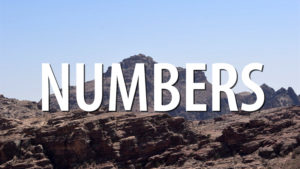 There are many “what might have been” incidents in the Bible. This section of the Bible records one such event. According to the record in Numbers, God commanded Moses to send spies into the land of Canaan to assess the difficulties that they would face as they entered the land. The result was a disaster resulting in the people revolting against the Lord and against Moses. However, when we consider the commentary on this event recorded in Deuteronomy 1:19-23, we find that it was the people who wanted to send spies into the land. God allowed them to do so. Upon their return, the majority report was that the land was indeed a land of “milk and honey” but the inhabitants of the land were much too formidable for Israel to conquer. The minority report, given by Caleb and Joshua, expressed the faith that since God was with Israel they were well able to take the superlative by repeating the term able, i.e., we are more than able to do it. The people obviously received the majority report.
There are many “what might have been” incidents in the Bible. This section of the Bible records one such event. According to the record in Numbers, God commanded Moses to send spies into the land of Canaan to assess the difficulties that they would face as they entered the land. The result was a disaster resulting in the people revolting against the Lord and against Moses. However, when we consider the commentary on this event recorded in Deuteronomy 1:19-23, we find that it was the people who wanted to send spies into the land. God allowed them to do so. Upon their return, the majority report was that the land was indeed a land of “milk and honey” but the inhabitants of the land were much too formidable for Israel to conquer. The minority report, given by Caleb and Joshua, expressed the faith that since God was with Israel they were well able to take the superlative by repeating the term able, i.e., we are more than able to do it. The people obviously received the majority report.
Joshua and Caleb were able to “see” in a deeper spiritual sense than were the other spies. They were much like the prophet Elisha in a later incident recorded in II Kings 6. Elisha’s servant was alarmed when he saw the Syrian army circling the city. Elisha prayed that God give the servant the ability to see in a much broader sense.
“Then Elisha prayed and said, “O Lord, I pray, open his eyes that he may see.” And the Lord opened the servant’s eyes and he saw; and behold, the mountain was full of horses and chariots of fire all around Elisha.” (II Kings 6:17)
As believers, we need to see and think in terms of God’s “horses and chariots of fire” today.
God’s plan for Israel to conquer the land was very simple. Recorded in Exodus 23:29-30, God would give them possession of the land, little by little, as they because fruitful and possessed it. They were approaching the land from the south, from the desert. God would bless them at the same time that He judged the Canaanites. They would, perhaps over generations, possess the land as they moved northward through the land. I call this the “Holy Ooze” plan. The Canaanites would hate this “holy” community and be repulsed by it and, thereby, be pushed northward out of the land.
The people rejected this “much too slow” plan. They embraced the typical human view of a brisk military campaign to take the land. Viewed from a normal human perspective, they concluded that they would not be able to overwhelm the Canaanites. They failed to take into consideration that God was in their midst and He would make the difference. Caleb and Joshua recognized this fact while the other ten spies did not. Caleb ben Jephunah and Joshua ben Nun have become the heroes of the modern settlement movement in Israel because the modern Israelis face a very similar situation today. The stated will of God is clear; however, the opposition is great.
The lesson to be derived from this section is that we must not over analyze the “faith assignment” (Romans 1:17) given to us by God. If God is the lord of our endeavors, He will cause us to prevail without regard to the opposition. We must take a step in faith and trust Him for the outcome.
One final thought recorded in this section that is worthy of our attention today. Here God again said to Moses that He had decided to wipe out Israel and “start over” with Moses and his descendants. In an earlier event recorded in Exodus 32:9-10, God declared that He was about to do the same thing. These two incidents amount to what is called “Replacement Theology” which is common in Christianity today. That doctrine declares that God has given up on Israel as a covenant partner in the plan of redemption and has now replaced Israel with the Church. Moses was given the test of Messiah. Would he be impressed with God discernment and pridefully accept God’s proposal or would he plead with God to remember His revealed plan of redemption and maintain it. Moses did the latter and gained God’s approval. Much of Christianity has done the opposite today by embracing “Replacement Theology”.